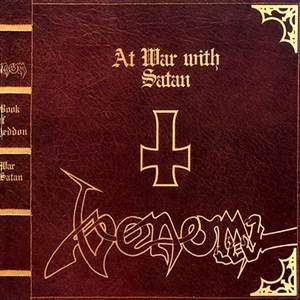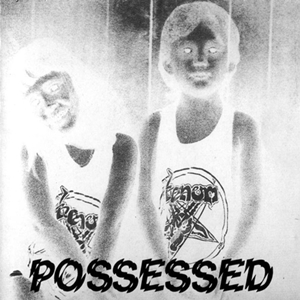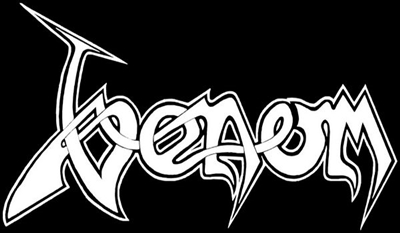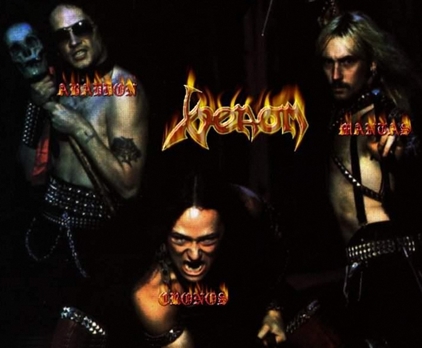Welcome to Hell dropped in December, 1981, immediately catching the attention of the hard rock and heavy metal communities. In those early days, the band hadn't really started playing gigs yet, though fans would show up at many of the rehearsals the band held in church halls. For some time, Venom refused to play local clubs around Newcastle, claiming they wouldn't perform at any venues that weren't large enough top support their vision for an over-the-top stage show. In fact, it wasn't until June of 1984 that Venom staged their first official concert in their home country, selling out the legendary Hammersmith Odeon in London. An opportunity arose around that time to play a large sports venue in Belgium, giving the band a chance to gauge the reception of fans unfamiliar with the band. The show was a success, and gave the band the confidence it needed to take the next big step.
In early '82, a small New York record store owner named Johnny Z contacted Neat with an interest in getting his hands on some copies of the debut Venom record. He sold out of the first shipment quickly and re-ordered, and also expressed interest in organizing a few US tour dates for the band. There was discussion about what band would open for Venom's US debut, and Cronos voted for a band he had seen a video of where the band was wearing a Venom tee shirt. The band turned out to be Metallica, who accepted and were added to the bill. The short tour was an immense success, creating a mass of fans hungry for more of the black metal pioneers. With their international fan base growing, the band hit the studio to begin work on its sophomore disc.
"Countess Bathory" Live (from the Ultimate Revenge: Combat Tour Live DVD)
|
|
|
|
|
Despite the success of Venom's debut, Neat still wasn't willing to spend a lot of money on what they considered an experimental style of music. The label only gave the band seven days to record its second full-length, an eleven-track masterpiece considered by many to be the true birth of black metal, the genre that would be named after it. Dozens of bands from nearly every extreme metal sub-genre have paid homage to Black Metal over the years, covering songs from the record and citing it as major influence on their formative years. Critical reception was mostly positive as well, at least among the publications that were willing to acknowledge extreme metal at that point. Black Metal has been recognized as one of the most important metal albums of all time by numerous publications and reader polls, including a 2005 poll of Kerrang! Readers that named the album #68 out of all British albums ever recorded.
Always thinking of the next step, Cronos made the decision that the third Venom record would be a concept piece like Rush's 2112 even before their second album was recorded. He even included a sneak preview on Black Metal with a 2-minute track entitled "At War with Satan (preview)". Firmly in charge of the band's direction, Cronos handled most of the production of early Venom albums, wrote the overwhelming majority of the songs, and even contributed the classic album cover art that has become so recognizable to metal fans all over the world. With Venom's fame rising, Cronos never relented and always maintained his vision, dismissing commercial acceptance as unnecessary.
|

At War with Satan
1984 |
|

Possessed
1985 |
|
At War with Satan dropped in April, 1984. Side one of the album featured only the epic title track, while the other side contained six much shorter tracks. A continuation of the preview track included on Black Metal, the epic song lasted an unprecedented 20 minutes. Cronos would later reveal that the preview track and epic on At War with Satan, when played together, lasted exactly 21 minutes and 12 seconds. This was not a coincidence, as Cronos designed it that way as a tribute to Rush, whose 2112 concept album inspired Cronos to go in that direction. At War was well received for the most part, though some critics complained that the band should be able to afford better production by then.
1985 brought about the first tension within the ranks of Venom, when Mantas pulled out of an American headline tour just days before getting started. With their fourth album already recorded and soon to be released, the band were forced to find a replacement last minute when the guitarist called in sick. The band eventually brought on Dave Irwin from Fist, but time was so short that Cronos feared he wouldn't be able to learn the entire set list. The decision was made to split the set in half and bring in a second guitarist for the songs Irwin wasn't learning, and Avenger's Les Cheetham was brought in. The two guitarists handled about half the shows on the tour before Mantas rejoined the band to finish the trek out. A few weeks after the tour, the band's fourth album was released, and it would be the last to feature the band's classic lineup, and the last released on the Neat Records imprint.
|
|
Possessed arrived in stores in April 1985 to mixed reviews. Many critics and fans considered the set a step back for the black metal heroes, and the album's poor sales caused more tension in the band. But while the immediate response was somewhat negative, the record held up much better in historical terms. In fact, some metal historians rank Possessed ahead of At War with Satan, even though the latter was more well received upon release. Cronos was already on the hunt for a new guitarist, having grown tired of Mantas's waning interest and involvement with the band. Cronos eventually decided to move forward as a four-piece, replacing Mantas with two guitarists, Mike Hickey and Jim Clare. With the two members in place, the quartet hit the studio to finish work on a fifth Venom full-length album, switching to a new label for the effort.
Released in November 1987, Calm Before the Storm was originally intended to be titled Deadline, but Cronos chose to scrap all of the contributions made by Mantas and rename the set. Released on the Filmtrax label, Calm Before the Storm had significantly better production quality than its predecessors. Filmtrax not only gave the band much more time than Neat had, but had better equipment as well. The album was also the first time Cronos allowed someone else to produce a Venom record, enlisting Nick Tauber to helm the project after his work with bands like UFO and Thin Lizzy. Cronos would leave the band shortly after the album dropped, taking Clare and Hickey with him to form a new band called Cronos. Venom carried on without him, releasing four albums and numerous compilations before calling it a day in 1992 when their label, Music for Nations, refused to release any more projects. None of the albums released without Cronos achieved commercial success, and most diehard metal fans do not even consider them Venom releases.
After leaving Venom, Cronos enjoyed a small amount of success with his eponymous band, though the material failed to leave the type of lasting mark on the metal community that Venom's early works did. Cronos, Abaddon and Mantas would reunite in 1995, and has since released five more albums and numerous EPs, live albums and compilations. While none of those releases have been met with the reverence metal fans hold for Welcome to Hell and Black Metal, they were considerably more successful than any of the Venom releases without Cronos. Abaddon and Mantas eventually left the band again, leaving Cronos as the only remaining member from the band's classic lineup, which is currently due to release a new album in 2014.
The legacy of Venom is well documented, with too many bands to mention here referring to them as a major influence in their own sound. Nearly every band that came out of the 80s Bay Area thrash scene was influenced by the band, including Metallica, Slayer, Exodus Testament and many, many more. Even later generations of bands hold Venom in high regard, as bands like Dimmu Borgir, Obituary and even Machine Head have released covers of Venom tracks over the years; and bands like Isegrim, Alchemist and Sigh have released entire albums in tribute to the Black Metal Gods. Venom's influence is so strong, in fact, that a whole generation of Scandinavian musicians formed their own black metal movement in the early '90s considering Venom as the Godfathers of their own movement.
|
|
|





